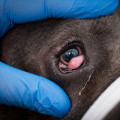If your pet is having any issues with their skin, it's essential to consult a vet right away. Not only can skin problems cause them pain or discomfort, but they can also worsen if left untreated. If your pet is scratching their ears or licking and biting their toes, it could be a sign of a fungal infection. Symptoms of this infection include irritated, itchy, or discolored skin, usually on the legs or ears.
Yeast infections are easy to diagnose and often respond well to topical creams. In some cases, your vet may prescribe oral medications, medicinal sprays, or medicinal baths. Steroids such as prednisone or dexamethasone are often prescribed to help control skin problems and reduce inflammation that causes pain and itching. Topical steroids should only be used when other options have been exhausted or when symptoms worsen. To successfully treat skin disorders, the underlying cause must be identified.
Topical treatments like antibiotic ointments, corticosteroid preparations, medicinal shampoos, and topical insecticides are often applied directly to the skin. It's important to use these products sparingly so that your pet doesn't lick them off and cause stomach discomfort. Once skin problems are identified and treated, there are steps you can take to prevent them from recurring. Regular bathing reduces the allergen burden and eliminates dead skin and loose hair. Some pets with sensitive skin respond well to essential fatty acid supplements that promote skin function.
And of course, regular flea control is a must in areas where fleas are endemic. An ASPCA pet health insurance plan may cover treatments for skin problems, including creams and medications. This is the easiest and fastest method of steroid administration and may be needed if your pet has chronic autoimmune problems or certain health conditions. It's important to remember that skin conditions can be uncomfortable for your pet and can worsen if left untreated. If you suspect your pet has a skin condition, contact your vet right away for diagnosis and treatment options. By following the advice of your vet and taking preventive measures such as regular bathing and flea control, you can help keep your pet's skin healthy and free from irritation.











Leave a Comment